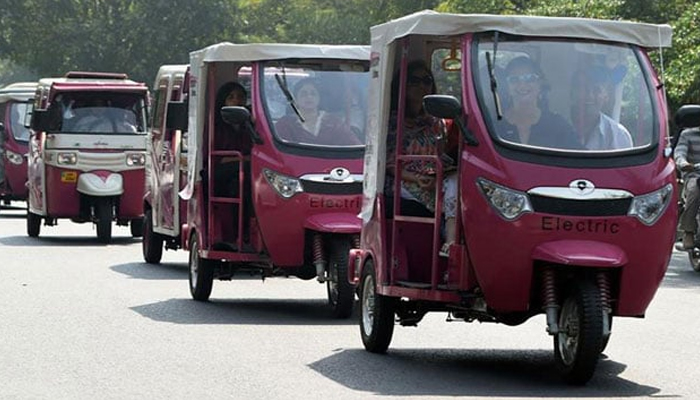35 women get rickshaw driving training
LAHORE: LUMS and City Traffic Police Lahore partnered to provide rickshaw driving training to women for the "Female Rickshaw Project." This project is a collaboration with the University of Oxford and leading microfinance institutions, including the (NRSP), Akhuwat, and RCDP.
The project was funded through the GEA initiative of the Abdul-Jameel Poverty Action Lab (J-PAL) at the Massachusetts Institute of Technology (MIT). The City Traffic Police Lahore has trained 35 women. CTO-Lahore Mustansar Feroze has deployed a team of four female officers to train women on traffic laws, rules and driving skills.
The traffic police also facilitated female beneficiaries for obtaining driver's licences. The prime objective of the project was to create income-generating opportunities and safe transportation for women.
The project promotes financial inclusion for female rickshaw drivers and contributes to their social and economic well-being. This partnership strives to drive positive change in Pakistan's workforce and is aligned with the Sustainable Development Goals (SDGs) 2023.
Dr Kashif Z Malik, Associate Professor at LUMS, stated: "The 'Female Rickshaw Project' offers a range of benefits for females, including economic empowerment, financial independence, and enhanced mobility.
Female rickshaw drivers will make transportation safer for women and serve as inspirational role models for others. This project contributes to cultural shifts and women's participation in the workforce and public spaces.
"CTO Lahore reiterated the resolve that the Traffic Police in line with the directives of the IGP Dr Usman Anwar will continue to provide free training to all female rickshaw drivers and will be a permanent part of this revolutionary effort. We will do whatever is required to empower women and support the vulnerable segments of society to make our society more inclusive.”
-
 Daniel Radcliffe Admits To Being Self Conscious While Filming 'Harry Potter' In Late Teens
Daniel Radcliffe Admits To Being Self Conscious While Filming 'Harry Potter' In Late Teens -
 Director Beth De Araujo Alludes To Andrew's Arrest During Child Trauma Talk
Director Beth De Araujo Alludes To Andrew's Arrest During Child Trauma Talk -
 Video Of Andrew 'consoling' Eugenie Resurfaces After Release From Police Custody
Video Of Andrew 'consoling' Eugenie Resurfaces After Release From Police Custody -
 'Harry Potter' Alum Daniel Radcliffe Gushes About Unique Work Ethic Of Late Co Star Michael Gambon
'Harry Potter' Alum Daniel Radcliffe Gushes About Unique Work Ethic Of Late Co Star Michael Gambon -
 Japan: PM Takaichi Flags China ‘Coercion,’ Pledges Defence Security Overhaul
Japan: PM Takaichi Flags China ‘Coercion,’ Pledges Defence Security Overhaul -
 Angorie Rice Spills The Beans On Major Details From Season 2 Of ' The Last Thing He Told Me'
Angorie Rice Spills The Beans On Major Details From Season 2 Of ' The Last Thing He Told Me' -
 Questions Raised Over Andrew Mountbatten-Windsor's Line Of Succession
Questions Raised Over Andrew Mountbatten-Windsor's Line Of Succession -
 'Shameless' Sarah Ferguson 'pressuring' Princess Eugenie, Beatrice For Major Reason
'Shameless' Sarah Ferguson 'pressuring' Princess Eugenie, Beatrice For Major Reason -
 Teacher Arrested After Confessing To Cocaine Use During Classes
Teacher Arrested After Confessing To Cocaine Use During Classes -
 Paul McCartney Talks 'very Emotional' Footage Of Late Wife Linda In New Doc
Paul McCartney Talks 'very Emotional' Footage Of Late Wife Linda In New Doc -
 Princess Beatrice, Princess Eugenie's Response To Andrew's Arrest Revealed
Princess Beatrice, Princess Eugenie's Response To Andrew's Arrest Revealed -
 King Charles And Princess Anne Bestow Honours At Windsor Castle
King Charles And Princess Anne Bestow Honours At Windsor Castle -
 King Charles 'worried' As Buckingham Palace, Royal Family Facing 'biggest Crisis'
King Charles 'worried' As Buckingham Palace, Royal Family Facing 'biggest Crisis' -
 Milo Ventimiglia Recalls First Meeting With Arielle Kebbel On The Sets Of 'Gilmore Girls' Amid New Project
Milo Ventimiglia Recalls First Meeting With Arielle Kebbel On The Sets Of 'Gilmore Girls' Amid New Project -
 Eric Dane Infuriated After ALS Diagnosis As He Feared The Disease Would Take Him Away From His Girls
Eric Dane Infuriated After ALS Diagnosis As He Feared The Disease Would Take Him Away From His Girls -
 It's A Boy! Luke Combs, Wife Nicole Welcome Third Child
It's A Boy! Luke Combs, Wife Nicole Welcome Third Child




